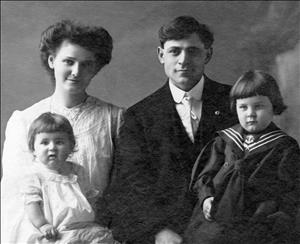This reminiscence by the then-bank teller Dorothea Pfister (later Nordstrand) (1916-2011) recounts the events of a rather alarming day at the Green Lake State Bank, located in the Green Lake neighborhood of Seattle. In 2009 Dorothea Nordstrand was awarded AKCHO's (Association of King County Historical Organizations) Willard Jue Memorial Award for a Volunteer, for contributing these vivid reminiscences to various venues in our community, including HistoryLink.org's People's History library.
A Day Like No Other
The day began like every other week day, with me walking the four familiar blocks toward Green Lake State Bank, where I had been employed as bookkeeper/teller for the past four years. At the intersection of 72nd and Woodlawn, from where I was "kittycorner" from the bank, I turned sharply to the right and continued down the sloping sidewalk to Green Lake Post Office, where I picked up the big canvas and leather locked bag containing the “clearings” (our customers’ checks that had been cashed at other locations and sent through the clearing house over night).
Back at the bank’s big front door, I inserted my key and let myself in, being careful to see that the door locked, again, behind me. The clock showed 8:00. In the next two hours, each check would be carefully scrutinized by two tellers to make sure the signature matched that on our bank of signature cards; that the written amount and the numerical amount matched; the date was current; and the endorsement on the back of the check agreed with the payee on the front. Then, after alphabetizing, two teller/bookkeepers would each take one half of the checks and, using two, big Burroughs bookkeeping machines, make the entries for each one on two sets of two foot square ledger sheets. Hopefully, the totals kept by the machines would agree with each other and with the figures that came with the checks from the clearing house. If not, we worked with them until they did.
It was from these ledger sheets we checked for whether or not checks presented at our teller windows could be cashed. It didn’t take long before we knew without looking if a check was “good.” We had a list in our heads of the accounts that ran “close to the edge.” I was comfortable with the responsibility of my position and well content with my life.
Midafternoon, a young man carrying a canvas gym bag entered our lobby and went directly to the big, marble table that ran down the center of the space. I particularly noticed him because it was unusual to have someone I didn’t recognize come into our small bank. When I next looked up, the young man was standing at my window with the gym bag on my counter and ... there was the muzzle of a hand gun pointing right at my cringing middle. I didn’t really need to read the scribbled message on the slip of paper he handed me with the hand that wasn’t busy with the gun to know that this was a hold up.
With icy little shivers running up and down my spine, I called to mind all the things we had been taught to do in a case like this. Don’t hit the alarm button if it might cause someone to be hurt ... . (The alarm was on the telephone pole right outside the bank ... and the someone who might be hurt was me ... so no alarm). Calmly, and deliberately follow the robber’s instructions ... . (Calmly wasn’t possible, but I could do deliberately) ... so I bundled up the contents of my cash drawer being sure to include what we knew as “bait bills,” several twenties whose numbers were on file with the police. This last touch was not on the robber’s list but was a “must” on mine. Then, I quietly handed the bundle to him and watched as he put it into the gym bag and headed for the door. All the time this went on, I was memorizing his appearance and made note of his height against the door frame as he left the building. I alerted Mr. Warren, who was in the office next to my cage and he ran to the window in time to see our man get into a taxi and leave.
Now it was okay for me to lose my calm ... but not until after I closed my window and balanced (which would show the amount of cash we had lost in the holdup). I grabbed a pencil and wrote down everything I could about his description before I had a chance to forget it, just in time to deliver that to the FBI men who answered Mr. Warren’s call for assistance.
Our robber was pretty clever. He took his taxi to another taxi stand, then took that second taxi to the bus station ... but quick work by FBI and good information from Mr. Warren and me had officers boarding the northbound bus in Everett to made the arrest. All the loot was there except for one twenty dollar bill, which, I assume, went for taxi and bus fare.
That night, my teller sheet was out by $20, and my day, which had started out like every other week day, had certainly taken a novel twist.

